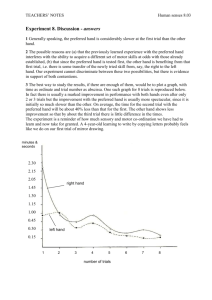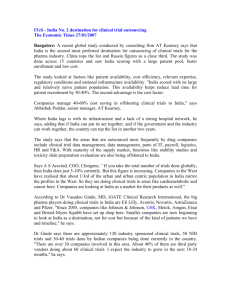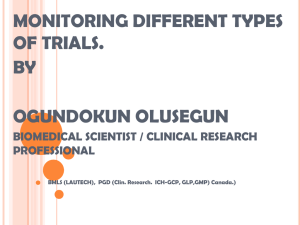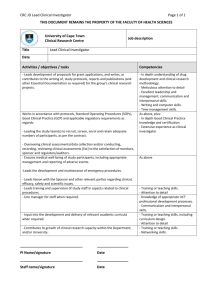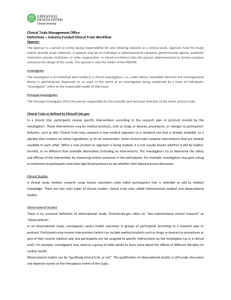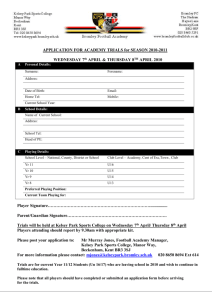Situation 1
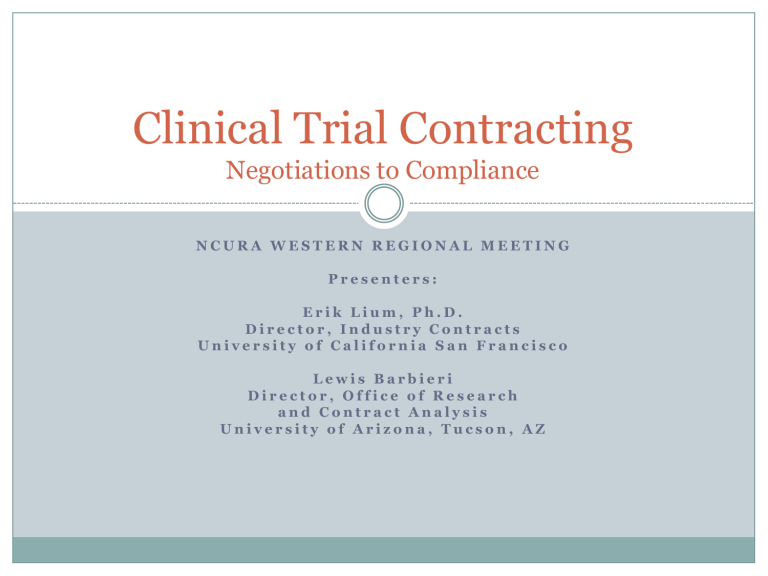
Clinical Trial Contracting
Negotiations to Compliance
N C U R A W E S T E R N R E G I O N A L M E E T I N G
P r e s e n t e r s :
E r i k L i u m , P h . D .
D i r e c t o r , I n d u s t r y C o n t r a c t s
U n i v e r s i t y o f C a l i f o r n i a S a n F r a n c i s c o
L e w i s B a r b i e r i
D i r e c t o r , O f f i c e o f R e s e a r c h a n d C o n t r a c t A n a l y s i s
U n i v e r s i t y o f A r i z o n a , T u c s o n , A Z
Overview
P R I M E R
F O C U S O N I N D U S T R Y F U N D E D C L I N I C A L T R I A L S
INDUSTRY-SPONSORED
INVESTIGATOR-AUTHORED
NOT FOCUSING ON DEVICE TRIALS
A D D ’ L F O C U S O N C O M P L I A N C E
I N T E R A C T I V E S E S S I O N
The Basics
R E G U L A T O R Y B O D I E S
P A R T I E S A N D F U N C T I O N S
T Y P I C A L C O N T R A C T I N G S I T U A T I O N S
Regulatory Bodies
• W H I C H B O D I E S G O V E R N C L I N I C A L T R I A L R E S E A R C H ?
• W H I C H R U L E S A N D R E G U L A T I O N S C O N T R O L S A I D
R E S E A R C H ?
• H O W A R E T H E S E R E Q U I R E M E N T S I M P L E M E N T E D A N D
E N F O R C E D ?
Clinical Trial Phases
After promising treatments are explored in animal and/or laboratory studies, researchers perform clinical trials. Once the drug, device or procedure enters the clinical trials process, it must go through several phases:
•Phase I
•Phase II
•Phase III
•Phase IV trials determine the safety of a new treatment trials determine efficacy and dosing for a new treatment trials study whether a new treatment is better than standard treatment trials find more information about a new treatment that has been already approved for use in patients
Institution Review Board – “IRB”
An Institutional Review Board is a group that has been formally designated to approve, monitor, and review research involving humans with an aim of protecting the rights and welfare of the subjects.
FDA Regulations state the requirements for Institutional Review
Boards
These requirements are stated in the Code of Federal Regulations:
21 CFR Part 56, subparts A-D
At any time, the FDA can audit/inspect an Institutional Review Board for compliance with said regulations and issue findings on the audit
Health Insurance Portability and
Accountability Act – “HIPAA”
HIPAA establishes regulations for the use and disclosure of Protected
Health Information (PHI).
PHI is any information about health status, provision of health care, or payment for health care that can be linked to an individual. This is interpreted rather broadly and includes any part of a patient’s medical record or payment history.
Entities must disclose PHI to the individual patient within 30 days upon request. They also must disclose PHI when required to do so by law, such as reporting suspected abuse to state child welfare agencies.
Entities may also disclose PHI to facilitate treatment, payment, or health care operations or if the covered entity has obtained authorization from
the individual.
When a covered entity discloses any PHI, it must make a reasonable effort to disclose only the minimum necessary information required to achieve its purpose.
FDA Investigator Financial Disclosure
This disclosure requires that the Principal Investigator certifies that s/he does not have a significant financial holding in the company with which he wishes to contract.
This helps to avoid conflict of interest situations in which the Investigator’s data may be called into question because of financial interest in the company.
Financial Arrangements that require disclosure include:
Compensation made to the investigator in which the value of compensation could be affected by study outcome.
A proprietary interest in the tested product, including, but not limited to, a patent, trademark, copyright or licensing agreement.
Any equity interest in the sponsor of a covered study, i.e., any ownership interest, stock options, or other financial interest whose value cannot be readily determined through reference to public prices.
Any equity interest in a publicly held company that exceeds $50,000 in value.
Significant payments of other sorts, which are payments that have a cumulative monetary value of
$25,000 or more made by the sponsor of a covered study to the investigator or the investigators' institution to support activities of the investigator exclusive of the costs of conducting the clinical study or other clinical studies, (e.g., a grant to fund ongoing research, compensation in the form of equipment or retainers for ongoing consultation or honoraria) during the time the clinical investigator is carrying out the study and for 1 year following completion of the study.
Clinical Trial Contracting
• W H O A R E T H E P A R T I E S T O A C L I N I C A L T R I A L ?
• W H A T T H E P A R T I E S N E E D T O N E G O T I A T E ?
• W H A T I S T H E A P P R O V A L P R O C E S S F O R T H E F I N A L
D O C U M E N T ?
Clinical Trial Overview
Sponsor
• Develops Protocol
• Provides Contractual and Budgetary guidelines to Contract Research Organization (CRO)
CRO
• Negotiates Investigator Budget with University
• Negotiates Clinical Trial Terms and Conditions with University
• Pays University through funding supplied by Sponsor
• Monitors study sites for source document comparison and Case Report Form Retrieval
University
• Sends invoices to CRO
• Sends final data to Sponsor or CRO Designee
• Indemnified by Sponsor (usually through a Letter of Indemnification)
Common “sticking points” between Sponsors/CROs and
Universities in Contract Negotiation
Confidentiality
• Protection of
Sponsor
Confidential
Information
• Maintenance of
Patient Records
Intellectual
Property
• Sponsor Protocol
• University Idea
• Who should own it?
Publication
• When can results be published?
• Why can publication be delayed?
• What about multicenter publications?
Indemnification
• Some Universities cannot reciprocate
Sponsor indemnification, even for University employee’s misconduct.
Contract Process: Clinical Trial Agreements (“CTAs”)
SPS/ORCA Interaction
Routing the Draft
Agreement
• Agreement comes to
Investigator or Contract Office
• Investigator forwards agreement to Contract Office
Tracking the Agreement
• Sponsored Programs logs agreement into University database as a draft
Negotiating the Agreement
• Contract Office contacts
Sponsor for purpose of negotiating terms of CDAs and
CTAs
Negotiating the Agreement
• Works as needed with:
• Investigator
• Office of Technology Transfer
• Office of General Counsel
• Risk Management
Pending Finalization
• Sponsored Programs receives internal routing documents and fully approved budget
Signing the Agreement
• Upon receipt of routing documents, Contracting Office executes the agreement, and forwards copies to Investigator and Study Coordinator
Typical CTA Contracting
Situations
• W H O W R I T E S T H E P R O T O C O L ?
• W H O P R O V I D E S I N D E M N I T Y ?
• H O W A R E T H E P A R T I E S B O U N D T O T H E A G R E E M E N T
T E R M S ?
Situation 1
UA and Pharmaceutical
Company enter into a contractual agreement
Pharma Co writes the
Protocol
Pharma Co offers UA full indemnification
Traditional Sponsored Clinical Trial Agreement
Pharma
Company
Protocol
Indemnity
Contract
University of Arizona
Traditional Investigator-Initiated Clinical Trial
Situation 2
UA and Pharmaceutical
Company enter into a contractual agreement
University PI writes the
Protocol
Pharma Company indemnifies UA: limited to manufacturing defects in the drug and use of the Study results
Pharma
Company
Indemnity
Contract
University of Arizona
Protocol
Situation 3
UA and Coordinating
Institution enter into a contractual agreement
(Subcontract)
Coordinating Institution has an agreement with the
Pharma Company (Prime
Award): Terms flow down to the Subcontract (IP,
Publication,
Confidentiality)
Coordinating Institution PI writes the Protocol
Each Institution is responsible for its own acts and omissions
Pharma Co indemnifies UA for manufacturing defects in the drug and use of the
Study results
Incoming IIR Subcontract through Coordinating
Institution
Pharma
Company
Coordinating
Institution
Protocol
Contract
(Subcontract)
Responsibility
University of
Arizona
Situation 4
UA and Pharmaceutical
Company enter into a contractual agreement
Coordinating Institution has an agreement with the Pharma Company
Coordinating Institution
PI writes the Protocol
Each Institution is responsible for its own acts and omissions as agreed in a letter of responsibility
Pharma Co indemnifies
UA for manufacturing defects in the drug and use of the Study results
Incoming IIR Contract: Other Institution’s Protocol
Pharma
Company
Coordinating
Institution
Protocol
Letter of Responsibility
University of
Arizona
Outgoing IIR Subcontract through UA
Situation 5
UA and Pharmaceutical
Company enter into a contractual agreement
(Prime Award): Terms flow down to the
Subcontract (IP,
Publication,
Confidentiality)
UA has an agreement with the Other Institution
(Subcontract)
University PI writes the
Protocol
Each Institution is responsible for its own acts and omissions
Pharma Co indemnifies
UA for manufacturing defects in the drug and use of the Study results
Other
Institution
University of Arizona
Protocol
Pharma
Company
Compliance Overview…
•
•
• F E D E R A L A N T I - K I C K B A C K S T A T U T E
F E D E R A L F A L S E C L A I M S A C T
R E G I S T R A T I O N O F C L I N I C A L T R I A L S
Federal Anti-Kickback Statute …
Purpose:
To protect patients and federal health care programs from fraud and abuse
Summary:
Prohibits the solicitation, receipt, offer or payment of remuneration “in return for” or “to induce” the referral of program related business, arranging for, or recommending, the purchase, lease, or ordering of any item or service reimbursed by a federal healthcare program
Penalties:
Civil:
Fines up to $50,000
Exclusion from federal health care programs
Criminal:
Felony
Up to five years in prison
Fines up to $25,000
20
Anti-Kickback: Trial Risks …
Direct payments to investigators
Incentives for investigators (i.e. exotic meeting locations)
Unbudgeted payments
Financial COI
Study biases (i.e. site selection, prescribing…)
Excess funds
Study merit
21
Anti-Kickback: Trial Risks & Solutions…
Direct payments to investigators
Institutional financial management
Incentives for investigators (i.e. exotic meeting locations)
Institutional contracting
Unbudgeted payments
Institutional financial management
Financial COI
Published and enforced COI policies
Study biases (i.e. site selection, prescribing, …)
IRB and training
Excess funds
Fair market value pricing
Published policies on the disposition of excess funds
Study merit
IRB review and approval
22
Federal False Claims Act …
Purpose:
To counteract fraudulent billing of the federal government
Summary:
Implicates anyone who knowingly submit claims … in order to obtain payment of a false or fraudulent claim by the federal government
Intent to defraud is not required
Qui Tam / Whistleblower Law
Penalties:
Civil:
Treble damages per false claim, plus
Civil penalties of $5,500 to $11,000 per false claim
Criminal penalties:
Predicated on willful violations
23
False Claims: Risks …
Centers for Medicare and Medicaid Services (CMS):
Medicare basics
Routine clinical services vs. investigational clinical services
Qualified clinical trials
Double billing or billing for items covered by the Sponsor
Secondary Payor (MSP)
24
False Claims: Medicare Basics …
Centers for Medicare and Medicaid Services (CMS):
Medicare general coverage:
Items and services that are reasonable and necessary for the diagnosis or treatment of illness or injury
Clinical Trial National Coverage Determination (NCD)
Coverage:
Items or services provided pursuant to trials if the items or services would otherwise be covered outside of a trial
Routine clinical services of qualified clinical trials
“Standard of Care” is not a defined term
Exceptions apply
25
False Claims: Routine Services…
Routine clinical services (covered):
Items and services covered outside of a trial
Items and services used for direct patient management in a trial
Items or services required solely for the provision of the investigational item or service (i.e. infusion of experimental chemotherapeutic)
Items or services required for the prevention, diagnosis, or treatment of complications related to an investigational item or service
Investigational clinical services (not covered):
Items and services being investigated as a trial objective
26
False Claims: Qualifying Clinical Trials …
Qualifying Clinical Trials (QCT):
Two-part test:
Part 1: (all three criteria are required)
Trial must investigate an item or service for which Medicare pays
Trial must enroll patients with diagnosed disease
Trial must have therapeutic intent
Part 2: (1 out of 5 criteria required) a.
b.
c.
d.
e.
Trial funded by AHRQ, CMS, CDC, DOD, NIH or VA
Trials supported by cooperatives supported by the agencies listed in “a”
Trials conducted under an IND
Trials conducted under an IND exemption
Trials conducted under the Coverage with Evidence Development process (rare)
27
False Claims: Non-QCT …
Non-Qualifying Clinical Trials
Nutraceuticals / Vitamins
Preventative care studies
Phase I drug studies
Studies funded by non-qualifying government agencies
Some investigator-initiated studies
Routine Clinical Care under non-qualifying studies
Not covered when conducted under a NQT
28
False Claims: Secondary Payor …
Medicare Secondary Payor (MSP)
Under MSP, a Medicare payment "may not be made . . . with respect to any item or service to the extent that payment has been made or can reasonably be expected to be made" under a primary plan.
Example contract language:
Unacceptable: “In the event Site is not reimbursed for routine clinical services contemplated in the Protocol, Site may remit an invoice to Sponsor.“
Acceptable: “Sponsor will be charged for items and services pursuant to the study that are not routine clinical services.
29
False Claims: Solution …
Determine whether a trial is a “Qualified Clinical Trial”
Convert trial protocol into a series of events
Perform a coverage analysis to identify
Routine clinical services
Investigational clinical services
Identify coverage exceptions
Align the informed consent, budget, contract and planned billing practices
Eliminate double billing, and billing for items covered by sponsor
Eliminate contract language implicating MSP
Coordinate with charge capture / billing
30
False Claims: Cases …
Rush University Medical Center Settlement: Improper Medicare
Billing in Clinical Trials Under September 2000 NCD
On December 8, 2005, the United States Attorney’s Office for the Northern District of Illinois reached a settlement with Rush University Medical Center in Chicago, under which Rush agreed to repay approximately $1 million to the federal and state governments for inappropriate clinical trials charges submitted to Medicare and
Medicaid. According … these charges relate to services and items provided … to patients enrolled in oncology clinical trials. …voluntary disclosure by Rush to federal authorities.
University Of Alabama-birmingham will Pay U.S. $3.39 Million to
Resolve False Billing Allegations
WASHINGTON, D.C. - The University of Alabama at Birmingham and two related entities will pay the United States $3.39 million to settle allegations that they violated the False Claims Act with respect to claims submitted in connection with the school's health science research activities.
31
Registration of Trials: FDA …
FDA Amendments Act (Public Law 110-05)
Definition of clinical trial:
Biologics: controlled, clinical investigations, other than Phase I investigations, of a product subject to FDA regulations
Devices: controlled trials with health outcomes, other than small feasibility studies, and pediatric post-market surveillance
When must registration be completed:
Within 21 days of 1 st subject being enrolled
When must a registration be updated:
Annually or within 30 days of any change in recruitment status or the completion of the study
Penalties:
Civil monetary penalties
Loss of federal funding
More information:
http://grants.nih.gov/grants/guide/notice-files/NOT-OD-08-014.html
32
Registration of Trials: ICMJE …
Int’l Council of Medical Journal Editors (ICMJE)
Definition of clinical trail:
Any … study that prospectively assigns human participants … to one or more health-related interventions to evaluate … health outcomes.
Interventions include drugs, surgical procedures, devices, behavioral treatments, process-of-care changes, and the like.
When must registration be completed:
Prior to enrolling the 1 st subject
When must a registration be updated:
Every 6 months
Penalties:
Publication of research results may be blocked by affiliate journals (NJM,
JAMA, Lancet, …)
More information:
http://www.icmje.org/index.html#clin_trials
33

